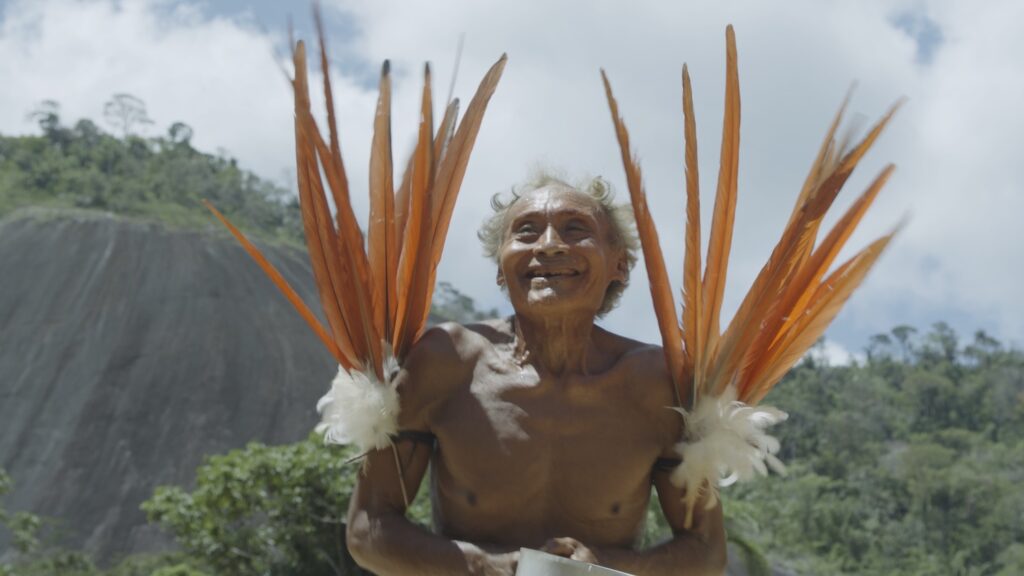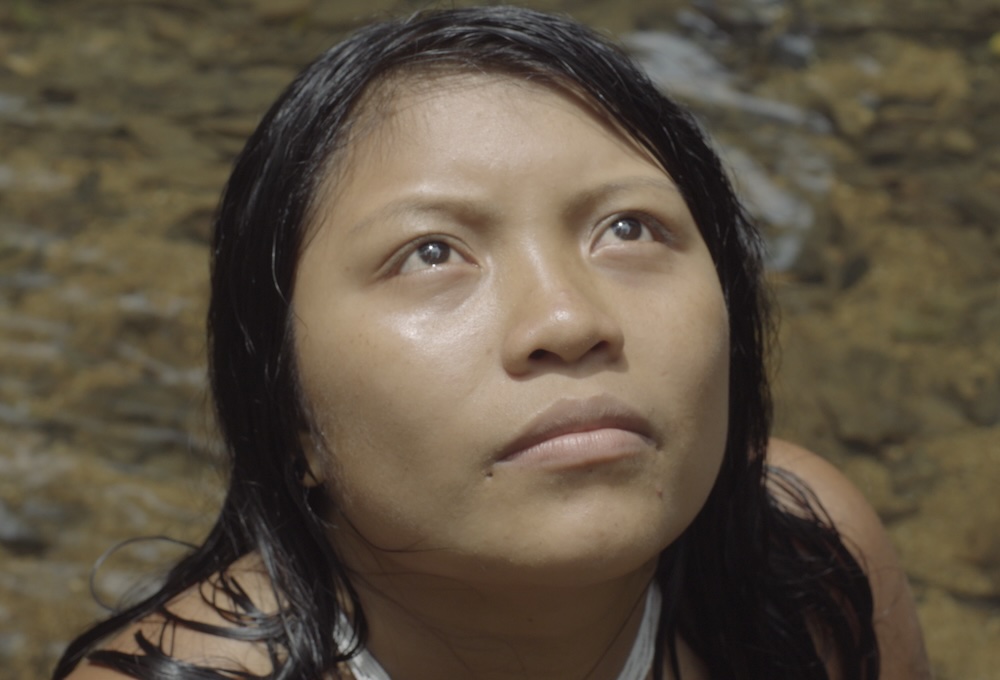The Falling Sky, directed by Eryk Rocha and Gabriela Carneiro da Cunha, arrives in the United States on November 17th. An adaptation of a book co-authored by Yanomami shaman Davi Kopenawa and French anthropologist Bruce Albert, the film is an intimate, autobiographical portrayal of the Yanomami peoples’ lives and their ongoing, decades-long fight to protect their lands and culture from the relentless encroachment of the napëpë—the outsiders. Written over a decade ago, the book’s message feels even more relevant and urgent today, as the threats against the Amazon rainforest continue to intensify.
After the sky fell for the first time, the great xapiripë spirits raised the sky up again. It will happen again. Today, miners and ranchers are destroying the forest-earth everywhere. So these ancient beings are again getting angrier and angrier. But as long as there are shamans, they’ll hold up the sky. But for how long?
– Davi Kopenawa, Yanomami leader
The film, narrated by Kopenawa, centers around the reahu funeral rite, an Indigenous ceremony held to release the spirit of the deceased. Through this on-screen ritual, audiences are immersed in the Yanomami’s understanding of life, death, and their deep interconnectedness with the natural world. Both the book and the film invite napëpë to experience Yanomami customs, traditions, and cosmology, aiming to create a deeper understanding among non-Indigenous peoples of the values rooted in forest peoples.

Frame from “The Falling Sky.” Courtesy of Aruac Filmes.
According to Albert, the Yanomami have a very comfortable relationship with death. “They are highly aware of impermanence, of the idea that [life] is a transmission [of knowledge] from one generation to the next. That’s why they’re so cheerful and so devoid of egotism and excessive narcissism. They know everyone has to give their children a sense of direction in the world, a groundedness, that’s just how it is. They don’t get too hung up on themselves. The same way they don’t like to own too many things. Once you’ve cried, and erased the traces, the dead person is gone, and you are free. They’re not tied to the dead like us, with cemeteries, etc. That leaves a heavy burden on us. They have a naturalness about death, which is why they place a very high value on life, and particularly the generosity of passing on knowledge.”
To the Yanomami, the idea of the “falling sky” represents an impending collapse—a world thrown out of balance by the harmful actions of outsiders. Kopenawa describes it as “the anger of the xapiripë,” a warning from ancient spirits that the destruction of the forest-earth may one day lead to an irreversible rupture. “The xapiripë are watching as miners and ranchers destroy our forest-earth,” he says, “and as their anger grows, the sky we know becomes heavier. One day, it may fall again. When it does, none of the napëpë will escape. You can run, but the storm will come, and you will wonder what is happening.”
For the Yanomami, this destruction threatens the very fabric of life on Earth. Kopenawa explains that the xapiripë, spirit beings who sustain the balance of the world, are disturbed by the devastation they see.
When the Earth is unexpectedly transformed, you can have as much money as you want, you can run with your money, but when the stormy winds come, you won’t be able to silence them. Times of lamentation will come.
– Davi Kopenawa, Yanomami leader
Kopenawa’s mission is not only to protect the Yanomami way of life but also to convey the gravity of dangers that face non-Indigenous people. “The law is still soft on miners, farmers, agribusiness, and the big mining companies. That’s why the destruction continues,” he says. Through The Falling Sky, he hopes to warn a world grappling with its own man-made crisis: “If we spread our images and our words everywhere… many people will understand and will help the government be stricter with their laws to stop the destruction of Brazil’s forest-earth.”

Frame from “The Falling Sky.” Courtesy of Aruac Filmes.
Directors Eryk Rocha and Gabriela Carneiro da Cunha were deeply committed to authentically capturing the intimate bonds between Yanomami mothers, children, and shamans. They devoted seven years to filming, embracing the natural rhythm of the forest that allowed them to capture rare and significant moments in Yanomami life. This approach enabled the directors to document sacred traditions, including the layered process of “erasing” a deceased person’s presence, intricate body painting techniques, and the shamanic ritual of inhaling yãkoana, a hallucinogenic powder central to Yanomami spirituality.
The success of both the book—originally published in French and now translated into several languages—and now the documentary, lies in how both authors and directors draw audiences closer to the Yanomami way of life. For Kopenawa, this recent opportunity to share his peoples’ story in Europe—the continent from which the first napëpë set out to exploit and harm Indigenous lands– transforms a history of violence into a powerful message of art and understanding. “The Portuguese came from Europe saying they’d ‘discovered’ this land of Indigenous people, calling it Brazil. But they discovered nothing—they just invaded! Now we’re the ones bringing The Falling Sky to Europe and the US, where it can be seen and heard by so many non-Indigenous people. We want to spread our Yanomami words, sending them to all parts of their world! We want them to become wiser and decide to help, so that the white people stop destroying our forest-earth!”
As The Falling Sky makes its US debut, Kopenawa brings the voices of his ancestors and his peoples’ decades-long struggle for survival into the spotlight. His message is one of urgency—a profound call to recognize that the future of the Amazon, the stability of the sky, and the fate of the planet are all deeply intertwined.
Tickets for US audiences can be purchased at this link. And if you’d like to support our work with Indigenous peoples in the Amazon, including the Yanomami, one of our longest-standing partners, please visit our giving page.
Note
- [1] Sumaúma. Understanding the Yanomami in Salgueiro’s samba school parade. January, 2024.








